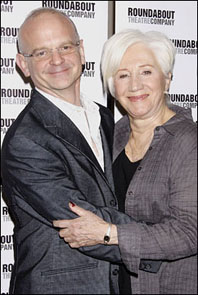
*
Not for nothing did Tennessee Williams name his heroine in The Milk Train Doesn't Stop Here Anymore after his own personal credo, "En avant!" The obvious irony, of course, is that Flora "Sissy" Goforth can no longer go forth.
She is discovered in her aerie overlooking the Amalfi coast, dictating to her much-taxed secretary, "Blackie," the story of the life she will be soon leaving — when, as is the way with these desperate or dying Williams women, along comes a stranger.
His name is Chris Flanders. He's one part poet and one part parasite, with a peculiar penchant — and history — for tending terminally ill heiresses. His appearance on her doorstep begs the question: Is he her last hope for love and happiness, or is he (as her gossipy confidante, The Witch of Capri, suggests) actually The Angel of Death?
Both heiress and secretary are widows — Blackie a recent one, and Flora four times over — so the stranger easily makes himself right at home in the middle of this death watch. "Flora, by her own admission," says Olympia Dukakis, who is now playing her at the Laura Pels Theatre, "is 'an old swamp bitch from Georgia.' She understood early on that what she had was sexuality and a physicality that could get her someplace, so she rode it. She got into 'the make-it, get-it, more-of-it, all-I-can-of-it.' She married four times. Two were ugly as apes, and one looked like an ostrich, and the fourth one was the only one she loved — the only one who wasn't 'rich as Croesus.' He was a poet, with the heart of a poet, and 'his spirit was as beautiful as his body.'"
The Italian counterpart of Flora "Sissy" Goforth is Serafina Delle Rose, the widow in Williams' The Rose Tattoo — a role Dukakis has done five times but not originally on Broadway and not in its first revival at City Center. "I had two meetings with Tennessee about it, and he said some wonderful things. Then, during the second meeting — how dramatic is this? — the phone rang. He went out to answer it and came back ashen. It was Maureen [Stapleton]. She was back. She'd evidently gone some place to dry out and heard they were doing it. He said, 'I have to go with her. She's my friend, and she originated it.' For her, it was a way of getting back in."
Hardly huffy about it, Dukakis huffed 'n' puffed into other Williams roles. Stella in A Streetcar Named Desire made her know the actor's life was for her. In her second year of stock, she played Rosa Gonzales in Summer and Smoke. She was Trinity Rep's Amanda in The Glass Menagerie. She understudied Maxine in The Night of the Iguana on Broadway (for Shelley Winters). She did Orpheus Descending twice and directed it once. She even did Goforth once at Williamstown — "not well," she concedes.
 |
||
| Michael Wilson and Olympia Dukakis |
||
| photo by Joseph Marzullo/WENN |
Even without the expected extensions, this Roundabout Theatre Company revival of Milk Train will log up 22 more performances than both of the play's Broadway runs combined — 69 with Hermione Baddeley and Paul Roebling in 1963 plus a measly five with Tallulah Bankhead and Tab Hunter a year later. Even a 1968 movie version with Elizabeth Taylor and Richard Burton, directed by Joseph Losey, went "Boom!" (which, perversely, happened to be its truth-in-advertising new title).
From these ashes, this Phoenix from Hartford is attempting to rise. And Wilson is no Pollyanna about this, either. "Milk Train is considered the start of Tennessee's 20-year downward spiral, the beginning of his 'Stoned Age,'" Wilson says, but he feels fate gave Williams a shove: During the year between those two Broadway Milk Trains, the playwright endured the lingering lung-cancer death of his long-term partner, Frank Merlo, and that personal loss understandably darkened, if not derailed, the play he was writing. "He was trying to explore the line between death and desire — the borders of those 'dragon countries,' as he calls them.
"With the blessings of the Tennessee Williams estate, we went through many drafts and rewrites that he did on this play to get to its heart. We even went back to the short-story version of this that he wrote in the '50s, 'Man Bring This Up the Road.'

"My feeling is that Milk Train was not well-shepherded as a play, like some where Tennessee had [Elia] Kazan by his side. Given everything that was going on in his personal life with Frank Merlo — and, yes, his own kind of behavior and habits — he was subject to whatever influence that would come his way. Basically, what we did was tie the play back to the themes of Iguana, which originally inspired it."










